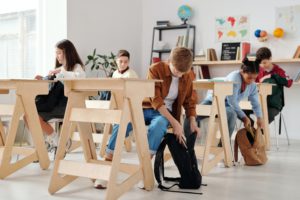With Scotland being the last of the four UK nations to resume in-person schooling on Monday 19th April, we thought to revisit the discussions and ideas from our first official event. Our official launch Re-thinking Education in Autism took place on 21st October 2020 online via Zoom with over 80 attending. We had speakers representing autistic youth, parents, researchers and advisory services. We have included some of the materials at the end of this blog post. Here are some highlights of the discussions we had.
Learning during lockdown
Many autistic children and young people have high anxiety around Covid-19 and hygiene, both for themselves and others around them. Some could be very rigid about the rules for social distancing and hand washing, and become agitated when others are not following them.

Autistic learners who were learning from home sometimes found it difficult as they normally associate school with learning, not home. Online learning also had its challenges: some found it even easier to miss social cues when all they have access to is a flat screen without other contextual hints about people’s responses. Having to share a computer with other members of the household also set limits to online learning. Despite these negative experiences, some children thrived at home because they were able to have control over their own routine and the clothes they wore, they were not required to wear the school uniform. Dr Jacqui Shepherd has recently published a report on these experiences. For those who went to school in person, some staff noticed that restricting autistic children to their own seats and closing safe spaces for relaxation such as the sensory garden can cause frustration and stress. Some students were coping well with some aspects, such as having more space and fewer people around: the school environment was less busy and less overwhelming in general.

Some parents reported struggles with balancing work and home life when schools closed, and this is especially true for key workers. They also found teaching at home challenging because it was a completely different context for the child to learn.
Observations from schools and hopes for the future
Schools saw an increase in the need for flexibility around pupils and the use of facilities, which special schools seemed to be more able to provide. Teaching staff noticed that the newer arrangement in schools seem to benefit many autistic students as it encourages a more personalised approach. On the return to schools, senior leaders were prioritising pupils’ wellbeing, and teachers felt that they were “given permission” to spend teaching time to promote wellbeing. One parent noted that more pre-emptive measures are needed for children with special educational needs and disabilities rather than waiting until crisis point.
We talked about the idea of “quick wins” – practices that can be retained and implemented relatively easily, such as: “If you want to know about a student, ask the student”, and “Plan for the child, not the label”. One school had reportedly gone “shoeless”, which proved to be less noisy and distracting for learners when others walk down the corridor during lessons. There was a debate about provision between mainstream and special school. Again, people advocated for a personalised approach.
The discussions showed many are hopeful that some of the covid-related adaptions should remain. Pupils appreciated not having to switch classrooms in between lessons. Being allowed to go into school in their PE kits and stay for the whole day was game-changing for some pupils. Another suggestion was for all learners to have a consistent support assistant to help build a strong relationship with in-depth knowledge of each learner’s specific needs. The implementation of year or class bubbles provided more familiarity for students and the staggered timings throughout the school day (such as lunch time and end of the day) could make it less overwhelming for students at these very busy times. The changes give a real opportunity to consider whole-school changes such as more flexible timetables and changes in the length and structure of the school day, with regular reviews. These pandemic experiences give an unprecedented opportunity to re-imagine education for special needs in radical ways: for example, what about a combination of in-person and online schooling? Both neurodiverse and neurotypical students can benefit from the school putting more time and resources towards promoting pupils’ well-being and from schools sharing their practices and experiences. Last but not least, we talked about how all autistic voices should be heard and included (e.g. verbal, non-verbal, AAC, etc). The new Our Stories project, run by ACoRNS Southampton and ACoRNS Sussex till next year, involves co-creating videos with such autistic voices to illustrate their perspectives (see Autism Transitions)
